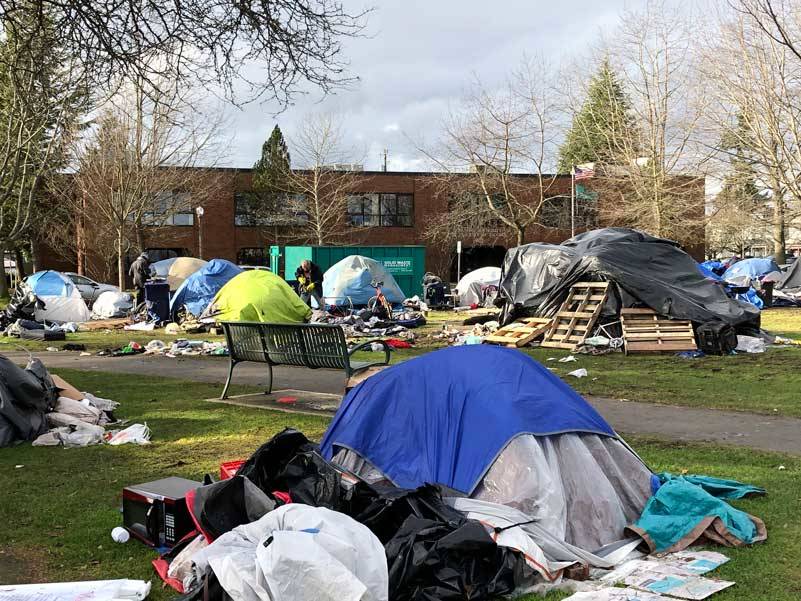By Morf Morford
Tacoma Daily Index
Challenging circumstances demand unexpected responses. Housing and homeless related issues are complicated, costly, deep and are certainly not going away any time soon – or even any time in the foreseeable future.
Widespread, nearly embedded, homelessness is a threat to individuals, neighborhoods and virtually every major city (and most smaller ones) around the world.
This is the social problem that is the death of a thousand cuts to any and every city.
It is also the social problem that is solved by an approximately equal number of solutions.
Traditional solutions, alternative solutions, even crazy, ridiculous and preposterous solutions suddenly seem practical, even reasonable.
There is probably nothing more foundational to stable individual and family life than consistent and affordable shelter.
Housing is central to any economy. As shelter, a place to decorate and certainly a source of employment for everyone from construction workers to plumbers, electricians, roofers, painters, maintenance and landscapers, the housing stock in virtually any city could maintain near-full employment indefinitely.
Home sales and rentals and the associated and related movers are just a few other categories of what could be called the full employment aspect of housing.
My point is that housing itself generates jobs.
As most of us know, whether we are homeowners, landlords or renters, we all know at a visceral level that home maintenance is never finished.
Any given project may be finished, but, as every homeowner knows, no roof or paint job lasts forever.
Some home repair or updates are optional – but many are not.
Most threats to home integrity are standard; roofs wear out and leak, plumbing degrades, and, in both areas, small leaks, left unattended, become expensive catastrophes.
But some are new and unexpected.
In the past few years fire – and smoke – have become a threat to both our housing stock and our literal health.
Here in the Pacific Northwest, with lumber, for obvious reasons, the building material of choice, other, less flammable materials from concrete to brick are being used more frequently.
The nearly ubiquitous (oil-based) composition roofing is being replaced (slowly) by metal (or other nearly indestructible, life-time) roofing surfaces.
Housing is the ultimate point of intersection between laws, zoning, history, economy, individual and civic identity.
Well-kept, or rehabilitated neighborhoods are the pride of any city.
And a home can certainly be a source of pride, as well as a good investment for an individual home-owner.
Stratospheric home prices threaten all of this.
As home prices increase by double digit percentages on a regular basis, with bidding wars on virtually every sale and cash-only deals, regular home-buyers of a previous generation, or even a year or two ago, are priced out of the market.
Large real estate investment companies – and more than a few pension fund corporations – are buying up these properties.
These “investments” are not always maintained or improved – or even occupied.
Many sit empty – for years.
In fact, thanks to this “investment strategy” come of the greatest threats to our civic identity and safety and affordable housing (whatever that means now) are made much worse.
Housing prices are driven up even higher and, in spite of a “hot” housing market in virtually every city in the world, more and more homeless people become more and more visible on our city streets.
As I mentioned at the beginning of this piece, challenging circumstances require, if not demand, unlikely solutions.
What if, for example, every condominium or apartment complex of a certain size (50 units perhaps) was required, or even better, volunteered, to raffle off at least one of their units?
This could be a great marketing tool. The raffle winner could be recognized as part of a grand opening or dedication ceremony. Who wouldn’t want all that free publicity?
There would have to be certain criteria for this to work, of course.
No investment companies or their proxies could participate.
Those developers who volunteered could set their own criteria – local families, single-parent households, or a convincing essay, but whatever the process, it would not involve the usual, often prohibitive, down payment and credit rating.
If housing is as basic as we all know it is, there should be some avenue for those who have had a rough stretch in their lives to get back into the housing game.
Several individuals have had “contests” like these.
I’d like to see them woven into the existing structure of more traditional real estate ventures.
Several small towns currently sponsor inducements to re-locate, from cash bonuses to free homes (https://www.bankrate.com/mortgages/places-paying-bounties-to-lure-residents/ or https://www.thepennyhoarder.com/make-money/places-that-will-pay-you-to-move-there/ or https://www.npr.org/local/305/2021/04/14/987174386/west-virginia-is-paying-remote-workers-12-000-to-move-there)
One company in the United Kingdom is taking this idea one step further. Home Competitions (https://www.homecompetitions.co.uk/) is coordinating a monthly home drawing with proceeds going to agencies that work with or advocate for the homeless.
I’d love to see something like this locally.
I’ve entered a few of these home raffles myself. I have not won my dream chateau yet, but if I can support a worthy cause along the way, that’s even better.
Check them out, you never know what might open up.
May the odds be forever in your favor.






